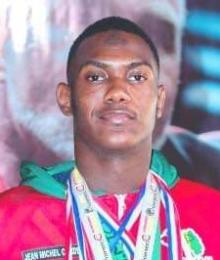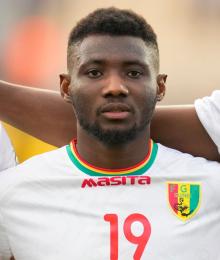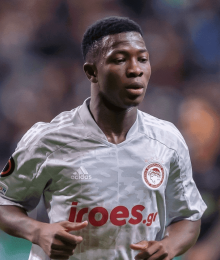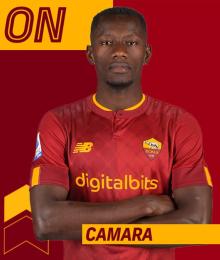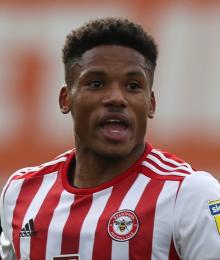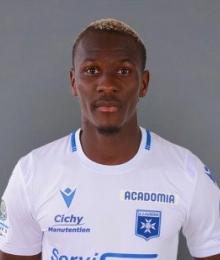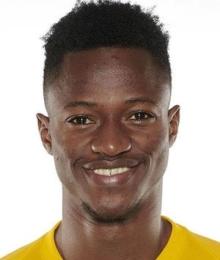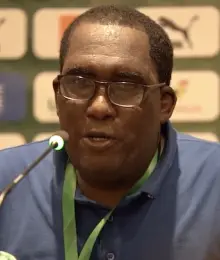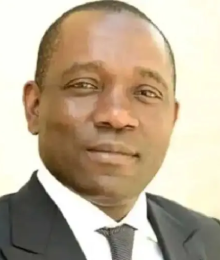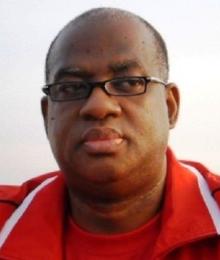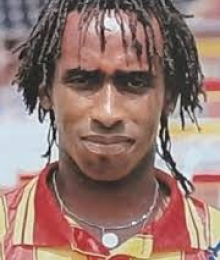
Abdoul Salam Sow, born on August 13, 1970, in Conakry, Guinea, is an iconic figure in Guinean football from the 90s, nicknamed the "Golden Boy" for his exceptional technique and vision of the game. As a talented offensive midfielder, he helped revolutionize his country's football by helping the Syli National regain its place on the continental stage after a 14-year absence from the Africa Cup of Nations.
His international career took him across three continents, playing notably for FC Martigues (France), Ankaragücü (Turkey), Belenenses and Imortal (Portugal), Qatar SC (Qatar), and Jeonnam Dragons (South Korea), before hanging up his boots in 2005. After retirement, he created the "Salam 3" football academy and regularly commented on the state of Guinean football, which he considers "globally sick," while nurturing the ambition to one day become the coach of the Syli National.
Introduction
Abdoul Salam Sow, nicknamed the "Golden Boy" of Guinean football, was born on August 13, 1970, in Conakry, although he originally hails from Labé in the heart of Foutah Djallon. An emblematic figure of Guinean football in the 1990s, he marked an entire generation with his exceptional technique, vision of the game, and ability to make "blind" passes with rare precision. As a talented offensive midfielder, Abdoul Salam Sow significantly contributed to revolutionizing Guinean football, notably by helping the country regain its place on the continental stage after a 14-year absence from the Africa Cup of Nations.
Earlier life and Education
Born into a family attached to traditional values, Abdoul Salam Sow grew up in Conakry where he developed his passion for football at an early age. Although information about his educational background is limited, it is evident that young Salam dedicated a large part of his childhood to perfecting his football skills in the streets of the Guinean capital.
His mother, Hadja Aissatou Touré (who passed away in September 2021), played a fundamental role in his life, as he himself confided: "My mother was my reference point, my compass on this earth." This strong relationship with his mother certainly helped shape his character and determination.
His early talent was revealed to the world when he participated in the U-17 World Cup in 1985, which constitutes one of the most remarkable achievements of his career.
National Career
At the national level, Abdoul Salam Sow quickly established himself as one of the most promising players of his generation. Although details about his early club career in Guinea are poorly documented, it is certain that he played for the best clubs in the country before going abroad.
His greatest contribution to Guinean national football is undoubtedly his role in the renaissance of the Syli National (Guinea's national team). After 14 years of absence from the Africa Cup of Nations, Salam Sow was one of the major architects of Guinea's qualification for the 1994 edition. During the qualifiers in Libreville, facing a tense situation in the team regarding the assignment of the captain's armband, it was he who motivated his teammates after a phone call from President Lansana Conté.
As he recounts himself: "In the locker room, I didn't tell what Lansana told me. Ten minutes before the kick-off, I gathered everyone and asked the coach and other staff members to excuse us. I told the team 'after 10 years, the time has come! They're waiting for us in Conakry, this team won't stop us, even the president is waiting for us.'"
Although he wasn't the official captain, Salam Sow was recognized as the "undisputed leader" of the team, notably forming a formidable duo with Titi Camara, another legend of Guinean football.
International Career
Abdoul Salam Sow's international career spanned three continents, demonstrating his versatility and talent recognized beyond African borders.
In Europe, he notably played in France with FC Martigues, where he spent a season in Ligue 1. He also played in Turkey, with Ankaragücü in the Süper Lig, as well as in Portugal, where he wore the colors of Belenenses and Imortal.
His career also took him to the Middle East, where he played for Qatar SC, and to Asia, where he joined the Jeonnam Dragons in South Korea. This diversity of experiences testifies to his adaptability and reputation on the international scene.
With the Guinean national team, Abdoul Salam Sow participated in several major competitions, including three Africa Cup of Nations tournaments. His most memorable moment remains the 2004 African Cup of Nations, where Guinea finished second in its group in the first round before losing in the quarter-finals to Mali.
He also maintained a privileged relationship with President Lansana Conté, who considered him as a son. As he revealed: "He took me under his wings. He wasn't just my president, he was a father... I could even call him at 5 in the morning."
Retirement
After a professional career spanning nearly 20 years, Abdoul Salam Sow hung up his boots in 2005, but officially marked the end of his career in 2014, during a jubilee organized on May 31 at the mythical September 28 Stadium in Conakry.
That day, emotion was palpable when the "Golden Boy," then 45 years old, stepped onto the field one last time in front of his many fans. For the occasion, illustrious African players made the trip: Abdoulaye Traoré Ben Badi (1992 African champion with Côte d'Ivoire), Mohamed Kallon (Sierra Leone), Moroccan Tarek, and Senegalese Alhassane N'dour.
The current generation of Guinean football was also present to pay tribute to this legend, with players like Sadio Diallo from Lorient and Issiaga Sylla. Visibly moved, Salam Sow declared: "From the bottom of my heart, I thank you. From the bottom of my heart, I thank the people of Guinea, I am overwhelmed with joy."
Private Life
Since his retirement, Abdoul Salam Sow has invested in training young people by creating a football academy called "Salam 3." Despite his enthusiasm for this project, he lamented the obstacles encountered: "I am still a victim of ill will from several leaders who prevent me from working."
In recent years, Salam Sow has not hesitated to express himself on the state of Guinean football, which he considers "globally sick." He particularly criticizes the management of governing bodies and advocates for profound reforms: "At the level of governing bodies, everyone must be in their place. As Sékou Touré said: 'The right man, in the right place.'"
In 2020, at the age of 49, the former Guinean international expressed his bitterness towards what he perceives as hypocrisy in the football world: "I am convinced that I belong to a hypocritical environment. It's when I turn my back that they start gossiping about me." This frustration even led him to request that after his death, his remains not be displayed: "I solemnly declare here, and I have already told my family, to avoid displaying my remains after my death... I don't need these vain speeches or eulogies."
In September 2021, he experienced a painful moment with the death of his mother, Hadja Aissatou Touré, whom he considered his "compass."
Conclusion
Abdoul Salam Sow remains one of the most emblematic figures of Guinean football. His exceptional talent, charismatic personality, and leadership helped write one of the most beautiful pages in the history of the Syli National. Despite the difficulties and disappointments encountered after his career, his impact on Guinean football remains undeniable.
Today, through his academy and his positions, he continues to fight for the improvement of football in his country. His stated ambition to one day become the coach of the Syli National testifies to his unwavering attachment to Guinean football: "I know I have the level to contribute, and I will work on it as I did when I was playing. My goal is to be the best in what I will do as a coach."
Abdoul Salam Sow, the "Golden Boy" who made an entire generation dream, remains a source of inspiration for young Guinean footballers, and his legacy will continue to influence the country's football for years to come.











